
Astragalus is a large genus of over 3,000 species of herbs and small shrubs, belonging to the legume family Fabaceae and the subfamily Faboideae. It is the largest genus of plants in terms of described species. The genus is native to temperate regions of the Northern Hemisphere. Common names include milkvetch, locoweed and goat's-thorn. Some pale-flowered vetches are similar in appearance, but they are more vine-like than Astragalus.

Astragalus canadensis is a common and widespread member of the milkvetch genus in the legume family, known commonly as Canadian milkvetch. The plant is found throughout Canada and the United States in many habitats including wetlands, woodlands, and prairies.

Lonicera sempervirens is a flowering plant species of honeysuckle vine native to the eastern United States which is known for its reddish flowers.

Castilleja exserta is a species of plant in the genus Castilleja which includes the Indian paintbrushes. Its common names include purple owl's clover, escobita, and exserted Indian paintbrush.

Andropogon glomeratus is a species of grass known by the common names bushy bluestem and bushy beardgrass. This bunchgrass is native to the Americas, where it is widespread. It has also naturalized in other areas.

Amorpha fruticosa is a species of flowering plant in the legume family Fabaceae, known by several common names, including desert false indigo, false indigo-bush, and bastard indigobush. It is native to North America.

Astragalus austiniae is a species of milkvetch known by the common name Austin's milkvetch. It is native to the Sierra Nevada of California and Nevada in the vicinity of Lake Tahoe. It is a plant of the alpine climate of the high mountains, where it tolerates exposed areas.

Astragalus bernardinus, known by the common name San Bernardino milkvetch or the Lesser Three-keeled Milkvetch, is a species of milkvetch. It is a plant of desert and dry mountain slope habitat. It is native to California.
Astragalus bicristatus is a species of milkvetch known by the common names crested milkvetch and two-crested milkvetch. It is endemic to southern California, where it grows in the coniferous forests of the San Gabriel and San Bernardino Mountains of the Transverse Ranges.

Astragalus congdonii is a species of milkvetch known by the common name Congdon's milkvetch. It is a perennial herb that is endemic to central California.
Astragalus curtipes is a species of milkvetch known by the common name Morro milkvetch. It is endemic to the Central Coast of California, including the Morro Bay area in San Luis Obispo County.

Astragalus gambelianus is a species of milkvetch known by the common name Gambel's dwarf milkvetch. It is native to California, with its distribution extending into Oregon to the north and Baja California to the south.
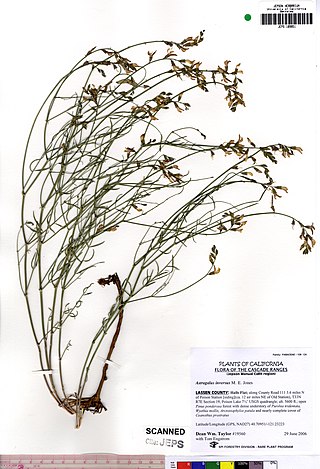
Astragalus inversus is a species of milkvetch known by the common name Susanville milkvetch.
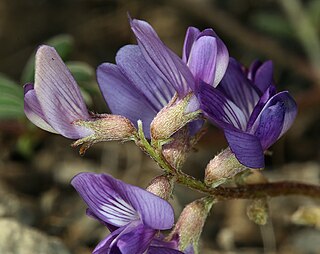
Astragalus inyoensis is a species of milkvetch known by the common name Inyo milkvetch.
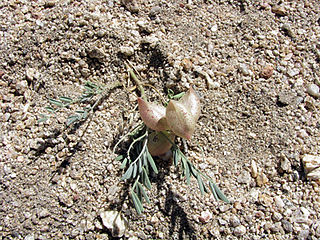
Astragalus nutans is a species of milkvetch known by the common name Providence Mountains milkvetch.

Astragalus pycnostachyus is a species of milkvetch known by the common name marsh milkvetch. It is endemic to the coastline of California, where it grows in wet saline habitat such as marshes.
Astragalus subvestitus is a species of milkvetch known by the common name Kern County milkvetch.
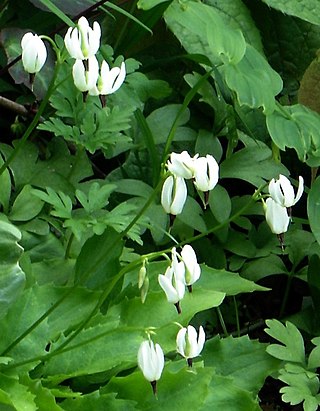
Primula latiloba, synonyms Dodecatheon dentatum and Dodecatheon latilobum, is a species of flowering plant in the family Primulaceae, known by the common names white shooting star and toothed American cowslip.

Vaccinium oxycoccos is a species of flowering plant in the heath family. It is known as small cranberry, marshberry, bog cranberry, swamp cranberry, or, particularly in Britain, just cranberry. It is widespread throughout the cool temperate northern hemisphere, including northern Europe, northern Asia and northern North America.
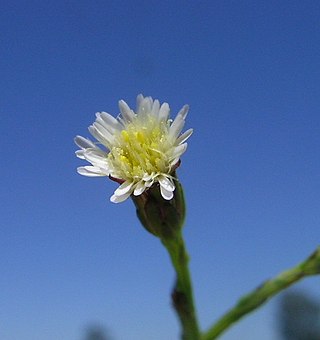
Symphyotrichum subulatum, commonly known as eastern annual saltmarsh aster or, in Britain and Ireland where it is naturalized, annual saltmarsh aster, is an annual plant in the family Asteraceae native to the eastern United States and the Gulf Coast to Texas. The species grows primarily in coastal salt marshes, although in the Ozarks it occurs as a non-marine weedy variety.


















